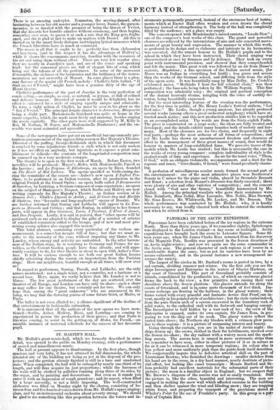ST. MARTIN'S HALL.
Mr. Hullah's great music-hall, which we formerly described in some detail, was opened to the public on Monday evening, with a performance of sacred and miscellaneous music.
The hall at present appears to disadvantage. In the first place, though spacious and very lofty, it has not attained its full dimensions, the whole intended site of the building not being as yet at the disposal of the pro- jectors • and the portion already finished is still in a bare and unadorned state. *hen completed, the hall will be enlarged by nearly one-third of its length, and will thus acquire its just proportions; while the bareness of the walls will be clothed by galleries running along three of its sides, by the organ, and by painting and decorations. But even as it stands you enter it with an impression of rough grandeur ; and its aspect, when filled by a large assembly, is not a little imposing. The well-constructed Orchestra was filled on Monday night by the chorus, consisting of be- tween four and five hundred voices drawn from Mr. Hullah's upper singing- class, and by an instrumental orchestra about seventy strong. We should be glad to see something like this proportion between the voices and in-
strumenta permanently preserved, instead of the enormous host of iamb: ments which at Exeter Hall often weaken and even drown the choral harmony instead of strengthening it. The body of the hall was completely filled by the audience ; not a place was empty.
The concert opened with Mendelssohn's sacred cantata, "Lauda Sion" • one of the composer's beat works of this class. The grand and powerful choruses are relieved by the intermixture of airs and solo concerted move- ments of great beauty and expression. The manner in which this work, so profound in its design and so elaborate and intricate in its harmonies, was executed, did the utmost honour to Mr. Hullah's pupils and to the school in which they have been instructed. Their choral singing was characterized at once by firmness and by delicacy. They took up every point with instrumental precision, and showed that they comprehended and felt the music. This great work was followed by an air from Hasse's oratorio, Magdalena; fine specimen of the Italian sacred music, (for Hasse was an Italia in everything but birth) ; less grave and severe than the works of the German school, and differing little from the style of the opera seria. It was beautifully sung by Miss Dolby. Dr. Crotch's celebrated motet, "Methinks I hear the full celestial choir," was then performed ; the bass solo being taken by Mr. William Seguin. This fine composition was admirably sung ; the original and poetical conception of the distant heavenly strains, mingling with the voice of earthly de- votion, being beautifully expressed.
But the most interesting feature of the evening was the performance, for the first time in public, of Mr. Henry Leslie's festival anthem, "Let God arise." Mr. Leslie, though a young amateur, has already produced several works (among others a great orchestral symphony) which have at- tracted much notice; and this new production entitles him to be regarded as an accomplished artist. The words are from the Sixty-eighth Psalm. The piece is constructed on a large scale ; the ideas are fully treated and developed ; and the details exhibit many beauties both of melody and har- mony. Most of the choruses are for two choirs, and frequently in eight real parts,—perhaps the most arduous of all forms of composition ; and yet Mr. Leslie has shown an unembarrassed freedom and clearness of effect in the management of these great masses of sound, that would do honour to masters of long-established fame. We perceive traces of the models which Mr. Leslie has studied; but this is necessarily the case in the works of every young composer : complete individuality of style is the gradual result of time and experience. An air for the tenor voice, "Thou, 0 God," with an obligate violoncello accompaniment, and a duet for the soprano and tenor, " Give thank- 0 Israel," were found peculiarly charm- ing. A profusion of miseellaneOus secular music formed the second part of the entertainment : one of the most attractive pieces was Beethoven's Sonata in C minor for the piano and violin, played by Sterndale Bennett and Ernst ; a selection from Mozart's Idomeneo was finely executed ; there were plenty of airs and other varieties of composition • and the concert closed with " God save the Queen," beautifully harmonized by Mr. Mullah. Among the principal vocalists who gave their assistance were Miss Rainforth, Miss Dolby, Miss Lucombe, Mrs. Noble, Miss Stewart, Mr. Sims Reeves, Mr. Whitworth, Mr. Lockoy, and Mr. Benson. The whole performance was conducted by Mr. Mullah; who, it is hardly necessary to say, was loudly cheered both when he entered the orchestra and when he retired from it.


























 Previous page
Previous page